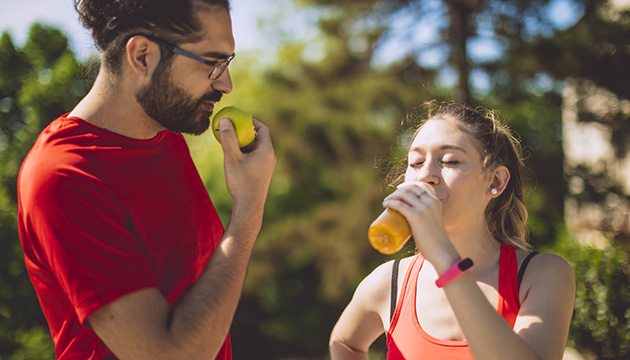Fueling your race: What to eat before, during and after a marathon

A PeaceHealth dietitian offers some dos and don'ts.
Victoria Witrak, RD, a dietitian at PeaceHealth St. Joseph Medical Center in Bellingham, Washington answers some questions about the do’s and don’ts of fueling for a long-distance race.
What foods should I avoid altogether when preparing for a marathon?
When it comes to nutrition and training, everyone’s metabolic needs and race goals are different.
I am constantly working with patients on changing our narrative around food restriction. Think more about how to add nourishing foods rather than how to take foods away. The only solid recommendation is to avoid adding a totally new food within a week of race day. Make sure you’ve been eating the foods you plan to consume day-of so your body is used to them.
What is “carb-loading” and when should I do it?
Carbohydrates are our primary source of fuel burned during prolonged exercise. Eating carb-rich foods before race day can help make the most of your glycogen — the source of stored energy in the liver. If you don’t have enough glycogen stores on race day, you might feel fatigued. You might also notice decreased endurance.
Carb-loading means eating more carbohydrates than you normally eat two to three days before your race. As a general rule, eat at least 3-5 grams of carbs per one pound of body weight. Your specific plan will depend on your individual training needs.
On the morning of a big race, when and what should I eat and drink?
I recommend a carb- and protein-rich breakfast two to three hours prior to start time. Try to eat at least 50 grams of carbs in this meal. An example would be two pieces of toast with nut butter and one banana. Then eat a carb-rich snack, such as a pureed fruit pouch, 15 to 30 minutes before racing.
In terms of fluid, try to drink 16 to 20 ounces with electrolytes before a race. It’s important that you start your race properly hydrated and not even slightly dehydrated.
Hydration and electrolytes during training become just as important as your fuel plan. Consider only drinking coffee if you’re used to it. Don’t go overboard. Caffeine can cause stomach upset. It’s also a diuretic, which means you might need to pee more often.
What should I eat during a run?
There is significant evidence for the benefits of eating carbs, limiting fat and limiting fiber during intense exercise. This is especially true if you’re exercising for more than two hours. Consider eating around 30 to 60 grams of carbs per hour. Eating carbs during exercise also helps drive water into your cells.
As I mentioned earlier, eat only the foods you have been eating during training. You don’t want to introduce a new food your body isn’t used to.
Examples of carbs to eat during your run:
- Dried fruit
- Fig bars
- Peanut butter and jelly
- sweet potatoes
- Waffles
- Gels, which are typically a blend of sugars without fat, fiber or protein. With gels especially, you should use them in training to make sure you can tolerate them.
How much water should I drink during a race?
You can lose up to two percent body weight through sweat/dehydration when exercising. That’s enough to slow you down or make you feel tired. It’s why staying hydrated during exercise is so important.
Consider also drinking electrolytes, which help us balance fluids and optimally use our muscles. (An imbalance in electrolytes can lead to muscle cramps and weakness.) During a race, aim to take in about 16 ounces of water and/or electrolytes. Depending on how much you sweat, you’ll also want at least 300 milligrams of sodium per hour.
Is there such a thing as drinking too much water?
Yes. This can lead to hyponatremia (low sodium). Having too little in your system can be fatal. This isn’t to scare runners away from drinking water. Just aim for a safe middle-ground.
What should I eat and drink after the race to help me recover?
Go for balanced snacks and meals with protein and complex carbs, like beans, oats, rice, sweet potato, fruits and vegetables. This helps repair your muscle and replenish glycogen stores. It’s best to eat within 30 to 60 minutes after exercise.
Many of us lose one to five pounds of sweat per hour while exercising, depending on weather conditions. You’ll want to drink 125 percent of the fluids you lost. An example of a great grab-and-go post-race drink is chocolate milk.
If you have a sensitive stomach, limit foods that might cause your system to feel upset. Common culprits include high fructose food and beverages, fat, fiber, sugar alcohols and cruciferous vegetables like broccoli, cauliflower and cabbage.
Victoria, a casual runner herself, earned her master’s degree in nutrition and dietetics from Bastyr University in Seattle, then completed a distance internship through the University of Texas—Houston with rotations in the University of Washington system. She has a special interest in sports medicine and gut health.





